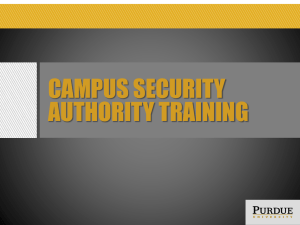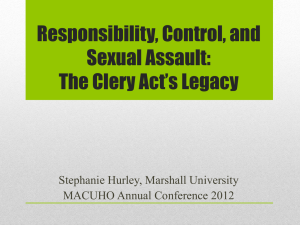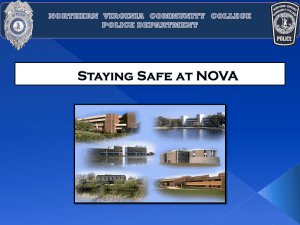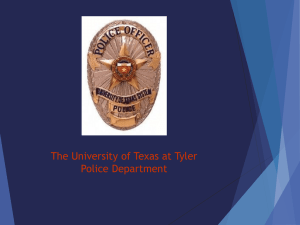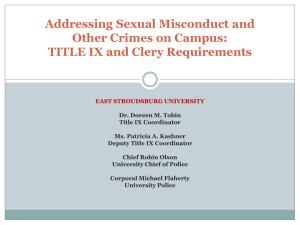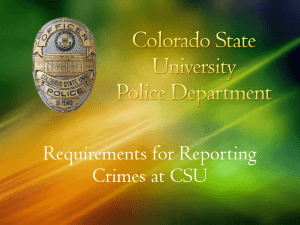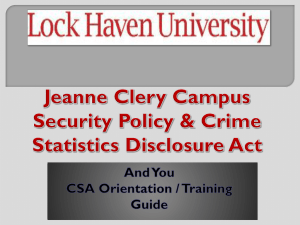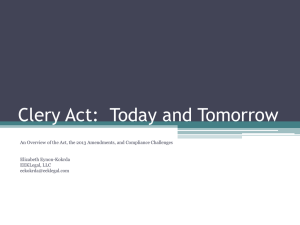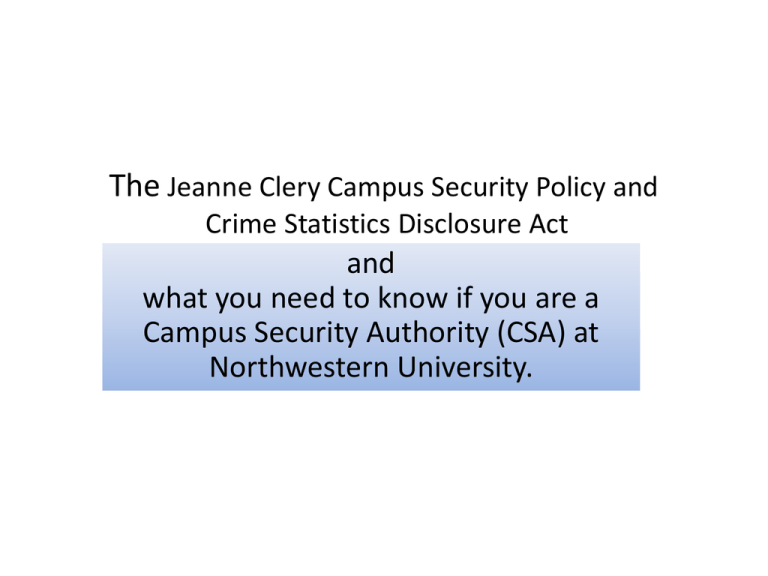
The Jeanne Clery Campus Security Policy and
Crime Statistics Disclosure Act
and
what you need to know if you are a
Campus Security Authority (CSA) at
Northwestern University.
The Clery Act, What’s That?
• The “Jeanne Clery Disclosure of Campus Security
Policy and Campus Crime Statistics Act” of 1998,
commonly referred to as the “Clery Act”, requires
institutions of higher learning receiving federal
financial aid to report specified crime statistics on
college campuses and to provide other safety and
crime information to members of the campus
community.
•
The Clery Act was enacted in the belief
that crime awareness can prevent campus
victimization.
• The Clery Act requires campuses to publish an Annual Security
Report detailing statistics regarding crimes committed on campus
and at affiliated locations for the previous 3 calendar years, and
describe specified policies, procedures and programs regarding
safety. The Department of Education monitors Clery compliance
and is authorized to impose fines on educational institutions that
fail to meet Clery requirements.
• University community members are notified, annually in
September, of the availability of and how and where to access the
ASR. The Chicago / Evanston Campus Annual Security Report also
includes a Fire Safety Report (a requirement for campuses with
University controlled residential facilities).
• For a listing of qualifying Clery Act reportable crimes, referral
categories and associated reportable geographic locations, see
Appendix A and Appendix B.
The Clery Act, Crime Reporting and
Campus Security Authorities (CSA)
• The Clery Act includes non-law enforcement
personnel in the role of a CSA (crime reporter)
to acknowledge that some community
members and students in particular, may be
hesitant about reporting crimes to the police,
but may be more inclined to report incidents
to other campus-affiliated individuals.
CSA Categories
The Clery Act defines four categories of CSA’s:
(i) University Police;
(ii) Non-police security staff responsible for
monitoring University property;
(iii) “Officials with significant responsibility for
student and campus activities”; and
(iv) People/offices designated under our policy
as those to whom/which crimes should be
reported.
CSA Categories - Defined
(i) University Police - Department sworn police personnel and Department
administrators.
(ii) Non-police people or offices responsible for campus security – University
Police community service officers, campus contract security personnel,
parking enforcement staff, personnel providing access control and/or
security at campus facilities, athletic events or other special events, safety
escort staff, residential community assistants and other similar positions.
(iii) Officials with significant responsibility for student and campus activities
category is defined broadly to ensure complete coverage and thorough
reporting of crimes. To determine which individuals or organizations are
CSA’s consider job functions that involve relationships with students. Look
for Officials (i.e., not support staff) whose functions involve relationships
with students. An Official is defined as any person who has the authority
and the duty to take action or respond to particular issues on behalf of
the University. If someone has significant responsibility for student and
campus activities, s/he is a CSA.
Some examples of CSA’s in category iii include, but
are not limited to: academic deans; student affairs /
residential life officials; coordinator of Greek affairs (or
related positions); athletic administrators including director,
assistant directors and coaches; student activities
coordinators and staff; student judicial officials; faculty
and staff advisors to student organizations; student center
building staff; student peer education advisors; and
administrators at branch campuses.
(iv) Any individual or organization specified in an institution's
statement of campus security policy as an individual or
organization to which students and employees should
report criminal offenses - University Police.
Who is not a CSA?
• The following non-CSA positions / functions
include but are not limited to: faculty member
without responsibility for student and campus
activity beyond the classroom; physicians/nurses
in Student Health who only provide care for
students; clerical or administrative support staff;
cafeteria staff; facilities maintenance staff;
information technology staff, licensed mental
health or pastoral counselors, when acting within
the scope of their license or certificate; and other
positions with similar functions.
The Role of CSA’s
•
As a CSA, if a student, faculty, staff member or non- affiliated party
tells you about a crime or incident that may be a Clery Act
qualifying crime, you are required to record the information on a
Campus Security Authority Crime Report form (available at
http://www.northwestern.edu/up/forms/forms.html) and submit
the completed Report form to University Police.
• CSA’s are encouraged to report all crimes reported to them by
students, employees and non-affiliated individuals, on a timely
basis, to University Police. However, under the Clery Act, CSA’s are
only obligated to report, Clery Act qualifying crimes (see Appendix
A).
• CSA’s should only report those crimes that have not been previously
reported to University Police or another University CSA.
From Which Locations Should Clery Act Crimes be
Reported?
• CSA’s are obligated to report Clery Act qualifying crimes,
but are encouraged to report all crimes, reported to them
which occurred in any of the following 4 locations.
Reported crime occurring outside these areas is not
required to be documented under the Clery Act. Clery Act
reportable location include:
– On-Campus University buildings or property
– Residence halls, fraternities, sororities or other student
residences
– Non-campus: leased off campus buildings / property
– Public property immediately adjacent to Northwestern
University property
See Appendix B for detailed location definitions.
CSA Incident Review Questions
• To help determine if an incident should be reported, ask yourself
the following three questions:
Was it reported to a Campus Security Authority?
Is it a Clery Act qualifying reportable crime?
Did the incident occur in one of the Clery Act geographically
defined areas?
• If the answer to these questions are “yes”, the you are required to
report the incident to University Police on a timely basis though,
CSA’s are encouraged to report all crime reported to them.
CSA Crime Reporting
• When a crime is reported, the CSA should first ask the person
if they would like to report it to University Police. If so, contact
University Police at (847) 491-3456. If not, at a minimum, for
Clery Act qualifying crimes, the CSA must complete and
submit, on a timely basis, a Campus Security Authority Crime
Report form, at
http://www.northwestern.edu/up/safety/annual-report/csacrime-report-form.html.
•
The Report Form can be submitted to UP online, by
fax (847) 491-4931 or mail (Northwestern University
Police, 1819 Hinman Avenue, Evanston, Il. 60208).
• Notify University Police immediately if the reported crime or
emergency threatens community safety.
• If the reported Clery Act qualifying crime is made in good faith,
meaning that there is reasonable basis for believing that the
information is not rumor or hearsay, then the crime is Clery
reportable. CSA’s, when interacting with the crime reporting
party, need to gather incident information that would provide
sufficient detail to properly classify the incident. This means
CSA’s need to document reporting party responses or lack
thereof.
• Reporting party identifying information should only be included
in the CSA Crime Report Form if the reporting party is willing to
provide same. CSA’s should not investigate the crime or attempt
to determine whether a crime, in fact, took place. When in
doubt, a CSA Crime Report Form should be completed and
submitted!
In Your Role as a CSA, Please Remember:
• Your job is to report incident information the
person is willing to tell you;
• You are not a detective – you aren’t suppose to
identify who was at fault or find the perpetrator;
• You don’t have to know the crime classification –
just indicate the crime that seems most likely or
possible;
• University Police will make the final crime
classification determination.
Sample CSA Statement and Referral Information
• As part of my position on campus, I am a federally mandated crime
reporter for the University. I am required to report this incident to
University Police for data gathering. If you request confidentiality, the
Report Form will not include your name, or that of any other involved
individuals. My report will contain only the information you provide.
Do you have any questions? Would you like to help me fill it out?
•
In addition to filling out and submitting the CSA Crime Report
form, it is important to offer options and referrals, as
appropriate, for victim support services. University
Counseling and Psychological Services \ for students
(CAPS, 847-491-2151 or at 847-491-8100 for after hours
emergency services) or the University Employee
Assistance Program (Perspectives, 800-456-6327) are
several options.
What is Done with CSA Crime Report Forms?
• University Police reviews CSA Crime Report Forms and makes a
determination if an incident warrants timely warning /
emergency notification of the University community and
determines the appropriate category for the incident in the
Annual Security Report (ASR).
• The Clery Act Coordinator will consolidate crime data from
multiple sources (including CSA reported incidents), report
qualifying crime data to the federal Department of Education,
publish campus ASR’s and inform the campus community when
and where ASR’s are available. The Northwestern University
ASR’s (Chicago/Evanston, Miami, Qatar and Washington, D.C.)
are posted at http://www.northwestern.edu/up/safety/annualreport/index.html. Hard copies are available from University
Police upon request.
CSA Annual Tally
(i) Each January, the Clery Act Coordinator distributes, to all primary CSA’s, an email
and CSA Tally form requiring the recipients to complete and return the form to
University Police to confirm that they do or do not have any previously
unreported Clery Act qualifying crimes / referrals that were reported to them in
the previous calendar year.
(ii) If CSA’s have previously unreported Clery Act qualifying crimes / referrals to
report, they are required to complete and submit to University Police a CSA
Crime Report form for each unreported incident.
(iii) The primary CSA’s are expected to distribute the CSA Tally email to individuals in
their area of responsibility who also are CSA’s and to advise these individuals to
likewise complete and return the Tally form or to report previously unreported
Clery qualifying crimes / referrals - see point ii).
(iv) * Note - ideally, CSA’s should report Clery qualifying crimes / referrals to
University Police on a timely basis and not wait till they receive the Tally
email each January.
Crime / Emergency and Non-Emergency Reporting
• Regardless of your status (CSA or non-CSA), all community members are
encouraged to promptly report all Chicago and Evanston campus related
criminal incidents and other public safety related emergencies to
University Police (or if off campus, to the local police department). For
incidents requiring immediate attention, dial 911 or use one of the “Blue
Light” Police Emergency Phones (call boxes) located throughout both the
Chicago and Evanston campus.
• University employees on campuses other than Chicago or Evanston should
contact their local law enforcement agency to report crimes and
emergencies in addition to notifying University Police of Clery qualifying /
reportable crimes / referrals.
• Chicago and Evanston non-emergency incidents can be reported by dialing
456 from any campus phone or in person at the campus University Police
station (211 E. Superior Street in Chicago or 1819 Hinman Avenue in
Evanston).
Campus Security Authority - Resources
•
In addition to this document, for information on the Clery Act and/or CSA responsibilities,
visit:
http://www.northwestern.edu/up/safety/annual-report/index.html, to access Northwestern University Annual
Security Reports for the Chicago / Evanston, Miami, Qatar and Washington, DC campuses;
http://www.northwestern.edu/up/safety/annual-report/csa-crime-report-form.html, to access the CSA Crime
Report Form (printable PDF and online submission options available).
http://www.northwestern.edu/up/safety/annual-report/campus-security-authorities.html
to view a information on CSA responsibilities and resources.
http://www.northwestern.edu/up/docs/clery_act_definitions_csa_reporting_sheet_1.2012.pdf
to view a Clery Act crime, reportable locations and CSA reporting information one page pdf.
Any questions on crime reporting or the Clery Act should be directed to the University Police Clery Coordinator
at 847-491-3752.
Visit the Security on Campus website for additional information on the Clery Act http://www.securityoncampus.org/
What Clery Act Crimes Require Reporting
(Appendix A)
The following is a listing of Clery Act Crimes that must be reported by CSA’s
receiving a report of any of the listed crime types. As earlier noted, CSA’s are
encouraged to report all crimes reported to them to University Police.
Murder
The willful (non-negligent) killing of a human being by another.
Manslaughter
The killing of another person through gross negligence.
Sex Offense (Forcible)
Any sexual act directed against another person without the other person’s consent
(includes attempts).
Sexual intercourse (penetration—however slight)
Sodomy (penetration—however slight)
Oral copulation (vaginal, anal)
Rape with a foreign object (penetration vaginal or anal—however slight)
Sexual battery (the touching of the intimate parts [sexual organ, anus, groin, or
buttocks of any person, or the breast of a female] of another person for the purpose
of sexual gratification).
Sex Offense (Non-forcible)
Any unlawful, but consensual sex act with another person (includes attempts).
•
•
Incest (sexual intercourse between persons who are related to one another within
the degrees wherein marriage is prohibited).
Statutory rape (intercourse with a person who is under the age of consent—18
years).
Robbery
The taking of personal property in the possession of another, from his/her immediate
presence, and against his/her will, accomplished by means of force or fear (includes
attempts).
Aggravated Assault
An unlawful assault upon the person of another for the purpose of inflicting severe or aggravated
bodily injury (includes attempts, and whether or not an injury occurred).
Burglary
Three elements must be met for an incident to be classified as burglary—unlawful entry, into a
structure, for the purpose of committing a felony or theft. If those three elements are not met,
the incident should not classified as a burglary.
It is not burglary when items are taken from open access areas, such as dining halls and libraries,
and the incident must occur in a structure (four walls, a roof and a door); telephone booths, gym
lockers and cubbies do not count. The offense of theft is not reportable under the Clery Act.
Motor Vehicle Theft
The taking of a motor vehicle (as defined) without the consent of the owner with the intent to
either permanently or temporarily deprive the owner of the vehicle (includes attempts).
Arson
The willful or malicious burning or attempt to burn (w/o the intent to defraud) a dwelling, house,
public building, motor vehicle or aircraft, or personal property of another (includes attempts).
Drug / Alcohol & Weapon violations – The Clery Act requires reporting of arrests and
referrals in these categories:
Drug/Narcotic Violations: The unlawful possession, sale, use, transportation, cultivation,
manufacturing, maintaining an unlawful place. Drug/narcotic violations referred for
campus disciplinary action under the Student Conduct Code need not be reported to the
Police Department.
Alcohol Violations: The unlawful possession, sale, transportation, manufacturing, furnishing
alcohol to a minor (under 21 years), or maintaining an unlawful drinking place. The Clery
Act does not require the reporting of public drunkenness or driving while under the
influence offenses. Alcohol violations referred for campus disciplinary action under the
Student Conduct Code need not be reported to the Police Department.
Weapons Violation: The unlawful possession or control of any firearm, deadly weapon,
(including nunchucks or billy club) illegal knife or explosive device while on the property of
Northwestern University except as required in the lawful course of business or as
authorized by the Northwestern University Associate Vice President for Public Safety and
Chief of Police.
Hate Crimes
• A criminal act involving one or more of the above listed
Clery Act crimes, the crimes of Theft, Simple Assault,
Intimidation and Vandalism, and any other crime involving
bodily injury which was:
motivated by bias against any person or group of persons,
or the property of any person or group of persons because
of the ethnicity, race, national origin, religion, gender,
sexual orientation, or disability of the person or group, or
bias based upon the perception that the person or group
has one or more of those characteristics.
Clery Act Countable Disciplinary Referrals
Incidents in which a student was not arrested but was instead referred
for campus disciplinary action for one or more of the following
offenses: liquor law violations; drug law violations; and illegal weapons
possession. Must be a violation of the law not just University policy.
• The following steps are required for a liquor, drug or weapon
referral for disciplinary action to be reported / counted for Clery
purposes.
(i) The official receiving the referral must initiate a
disciplinary action;
(ii) A record of the action must be kept; and
(iii) The action may, but does not have to, result in a
sanction.
What Clery Act Locations Require Reporting (Appendix B)
On-Campus Property:
(i) any Northwestern building or property owned or
controlled by an institution within the same reasonably
contiguous geographic area and used by the institution in
direct support of, or in a manner related to, the
institution's educational purposes, including residence
halls / Greek houses; and
(ii) any Northwestern building or property that is within or
reasonably contiguous to the area identified in paragraph
(i) of this definition, that is owned by the institution but
controlled by another person, is frequently used by
students and supports institutional purposes (such as a
food or other retail vendor).
Non-Campus Property:
(i) Any Northwestern building or property owned or
controlled by a student organization that is officially
recognized by the institution; or
(ii) Any building or property owned or controlled by an
institution that is used in direct support of, or in
relation to the institution's educational purposes, is
frequently used by students, and is not within the same
reasonably contiguous geographic area of the
institution.
Public Property:
Public property is defined by the Clery Act regulations as
all public property including thoroughfares, streets,
sidewalks, and parking facilities that is within the
Northwestern campus, or immediately adjacent to and
accessible from the campus.
Includes the sidewalk, street and opposite sidewalk
immediately adjacent to Northwestern property, but
does not include public property beyond the second
sidewalk.
Revised 1.2012

